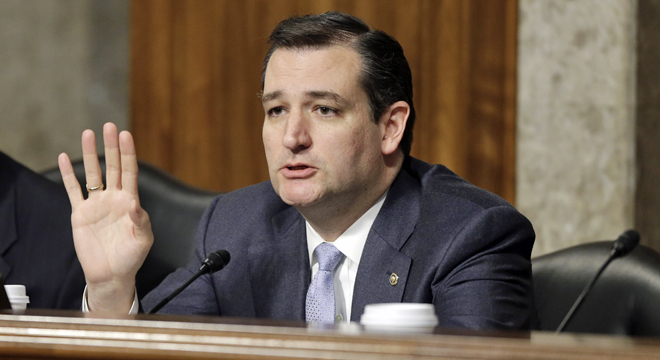Sen. Ted Cruz (R-TX) will push a 60-vote threshold, meaning he’s threatening to filibuster, on a clean debt ceiling increase extension.
Cruz’s office confirmed the Texas senator’s plans to TPM on Tuesday afternoon.
Cruz’s move means lawmakers will need to rally 60 votes in the chamber to pass the bill, and Democrats only control 55 votes.
The announcement came the same day that House Republicans dropped a previous debt ceiling increase proposal and embraced a clean hike instead.
That decision sparked outrage from tea party groups with Tea Party Patriots co-founder Jenny Beth Martin calling it a “complete capitulation.”
The Senate vote on the clean debt ceiling bill is likely to come shortly after the House vote planned for Tuesday evening.
Read his full statement below:
“If you ask anybody outside of Washington whether we should keep increasing the debt ceiling without fixing the underlying problem of out-of-control spending, the answer is ‘of course not.’ This answer cuts across party lines and ideology—outside the Beltway, Republicans, Democrats, Independents, and Libertarians all agree that living within your means is basic common sense. And yet Washington is not listening to the American people.
“Under President Obama, our national debt has increased from $10 trillion to $17 trillion, and now the President is asking for yet another blank check to keep increasing our debt without doing anything to reform Washington’s spending problem. This is wrong, and it’s irresponsible. Our parents didn’t do this to us, and we shouldn’t do it to our kids and grandkids.
“Historically, the debt ceiling has proven the most effective leverage for reining in spending; 28 times, Congress has attached meaningful conditions to debt ceiling increases. We should do so again to address the real problem. I intend to object to any effort to raise the debt ceiling on a 50-vote threshold. I will insist instead on a 60-vote threshold, and if Republicans stand together we can demand meaningful spending restraint to help pull our Nation back from the fiscal and economic cliff.”






